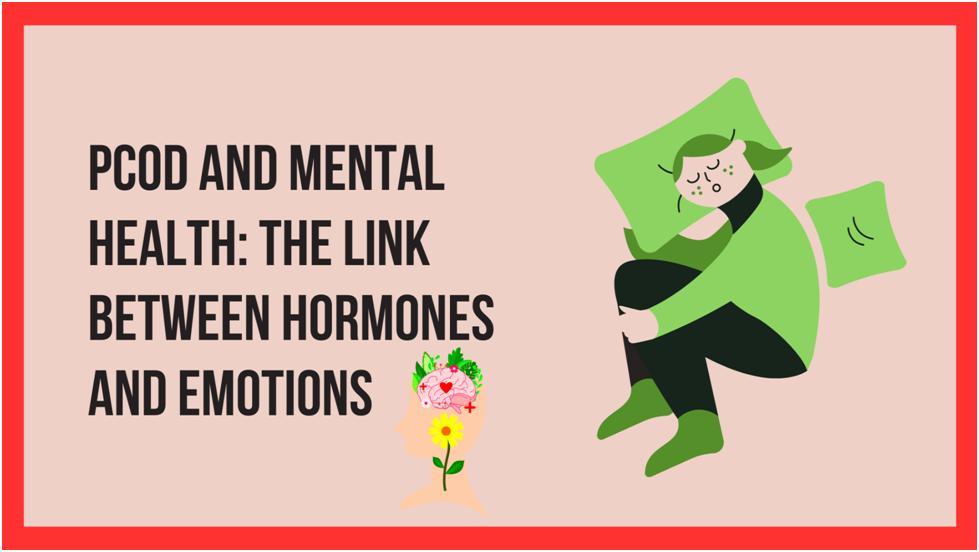
PCOD and Mental Health: Understanding the Connection
The Impact of Hormonal Imbalances on Emotional Well-being PCOD disrupts the delicate balance of hormones in a woman’s body, leading to irregular menstrual cycles, excess androgen production, and insulin resistance. These hormonal imbalances can have a profound impact on a woman’s emotional well-being. Research suggests that women with PCOD are at a higher risk of developing mental health conditions such as anxiety, depression, and mood swings.
Hormones and Emotions
The Chemical Cascade :
The intricate connection between hormones and emotions lies in the chemical cascade that occurs within the body. Hormones act as messengers, transmitting signals between cells and organs. When hormones are imbalanced, these signals can become disrupted, leading to emotional disturbances. For example, elevated levels of androgens in women with PCOD can affect neurotransmitters like serotonin and dopamine, which play a crucial role in regulating mood.
The Effects of PCOD on Mental Health
Anxiety: The Silent Intruder
Women with PCOD often experience heightened levels of anxiety. The constant uncertainty surrounding menstrual cycles, fertility, and physical symptoms can create a sense of unease and worry. Moreover, the hormonal imbalances in PCOD can directly contribute to anxiety disorders by affecting the brain’s stress response system.
Depression: Navigating the Dark Clouds
Depression is another common mental health concern among women with PCOD. The hormonal imbalances, coupled with the challenges of living with a chronic condition, can trigger feelings of sadness, hopelessness, and a loss of interest in previously enjoyed activities. The hormonal fluctuations associated with PCOD can further exacerbate these depressive symptoms.
Mood Swings: Riding the Emotional Rollercoaster
One of the most recognizable effects of PCOD on mental health is the prevalence of mood swings. Women with PCOD may experience sudden and intense shifts in mood, ranging from irritability and anger to sadness and tearfulness. These emotional rollercoasters can disrupt personal and professional relationships, impacting overall quality of life.
Causes of the Link between PCOD and Mental Health
Biological Factors: The Hormonal Orchestra
The primary cause of the link between PCOD and mental health lies in the complex interplay of hormones within the body. Hormonal imbalances, particularly elevated levels of androgens, can directly impact brain chemistry, leading to emotional disturbances. Additionally, the physiological symptoms of PCOD, such as acne, weight gain, and hirsutism, can contribute to lowered self-esteem and body image issues, further influencing mental health.
Psychosocial Factors: The Impact of Stress
The psychosocial impact of PCOD cannot be overlooked when considering its effects on mental health. The distress associated with the challenges of managing a chronic condition, concerns about fertility and pregnancy, and societal pressures can significantly contribute to stress levels in women with PCOD. Chronic stress, in turn, can further exacerbate hormonal imbalances and worsen emotional well-being.
Management Strategies: Nurturing Hormonal and Emotional Balance
Medical Interventions: Balancing the Hormones
When it comes to managing PCOD and its impact on mental health, medical interventions play a crucial role. Treatments aimed at normalizing hormone levels, such as hormonal contraceptives or anti-androgen medications, can help restore the hormonal balance and alleviate emotional symptoms. Consulting a healthcare professional is essential to determine the most suitable treatment approach for individual needs.
Lifestyle Modifications: Nurturing Emotional Well-being
Alongside medical interventions, lifestyle modifications can play a significant role in nurturing emotional well-being. Regular exercise, a balanced diet, stress management techniques such as meditation or therapy, and prioritizing self-care can contribute to overall mental health. Building a strong support system and seeking counseling or support groups can also provide a safe space to share experiences and coping strategies.
While PCOD can contribute to mental health challenges, it is important to note that the condition itself does not directly cause severe mental health conditions. However, the hormonal imbalances and the challenges associated with living with PCOD can increase the risk of developing conditions such as anxiety and depression.
There is no specific cure for mental health issues related to PCOD. However, with appropriate management strategies, including medical interventions, lifestyle modifications, and emotional support, the symptoms can be effectively managed, and overall well-being can be improved.
In some cases, hormonal contraceptives can worsen mental health symptoms. However, this response varies from person to person. It is essential to consult with a healthcare professional to determine the most suitable contraceptive option based on individual needs and concerns.
Emotional well-being strategies, such as stress management techniques and self-care practices, can complement medical interventions in managing PCOD symptoms. However, these strategies alone may not be sufficient to address the underlying hormonal imbalances. It is crucial to seek professional medical advice for comprehensive management.
PCOD is a chronic condition that requires long-term management. While symptoms can be effectively managed, the underlying hormonal imbalances may persist. Regular medical follow-ups and lifestyle modifications can help maintain optimal health and well-being.
Supporting a loved one with PCOD and mental health challenges involves providing empathy, understanding, and a non-judgmental space for open communication. Educate yourself about PCOD, be supportive of their treatment journey, and encourage them to seek professional help when needed.
